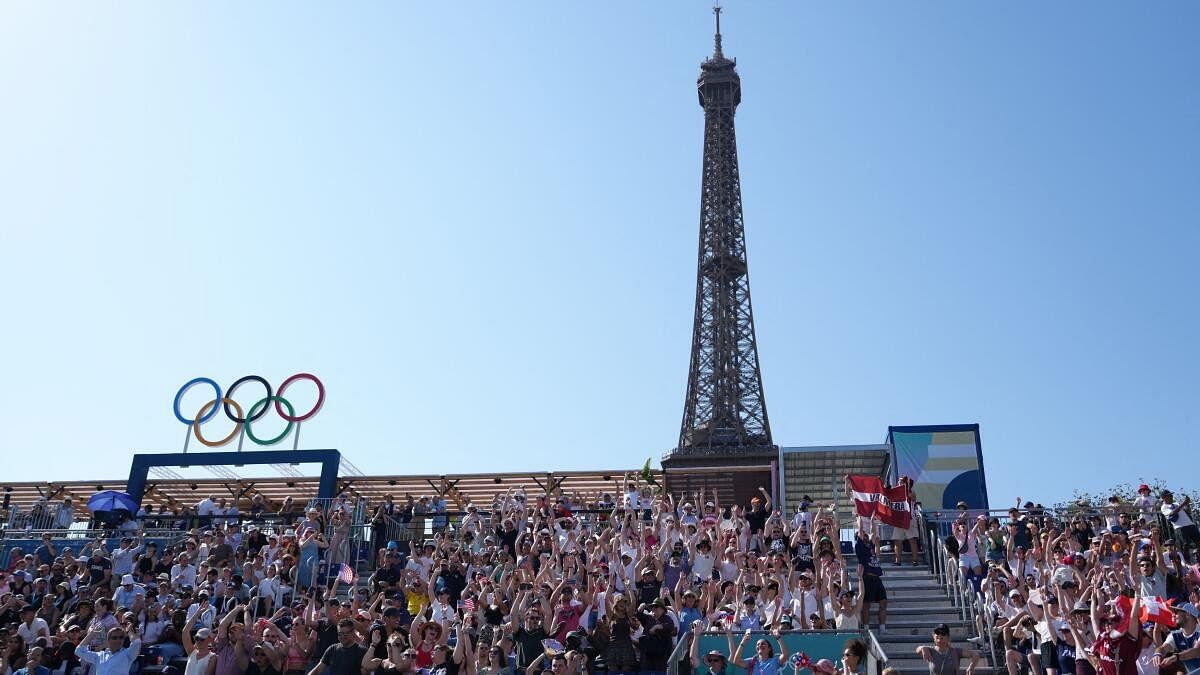
Eiffel Tower Stadium, Paris, during the Olympics
Credit: Reuters Photo
Beyond sport, the Paris Summer Olympics 2024 embodies, on a European scale, a phrase often heard in India these days that ‘elections have meaning’. This important message was writ large on the beaming face of French President Emmanuel Macron as he declared open the ongoing games, undoubtedly the apex moment of his seven-year presidency.
His political rivals of the far Right played into Macron’s hands when they chose Aya Nakamura as their primary target for criticism of this year’s Olympics. Nakamura, a cent percent French singer of Malian ethnicity, was one of several Black artistes who took the opening ceremony by storm. She is living proof that diversity and multi-ethnicity in France are alive as the recent legislative elections demonstrated, when that country’s majority united to defeat extremism. It was hard fought into a second round of voting. There are similarities in the French and Indian experiences of heterogeneity and multi-polarity.
Céline Dion, unmistakably white, singing from the Eiffel Tower, watched by one billion people worldwide, according to Sky News, globalised Francophone culture, especially across the Atlantic. Dion is Canadian French, an icon in North America. The love story of Dion’s life is similar to that of Macron, who married his schoolteacher. Because Brigitte Macron is 24 years older than the president, Macron’s family opposed their relationship. Dion married her manager who was 26 years older. René Angélil met Dion, a child prodigy, when she was only 12 years old and began managing her career. Their relationship turned romantic when she was 20. They married after six years of courtship. The Paris concert was Dion’s first performance in three years because of ill health.
It was a striking gesture of transcontinental, post-colonial reconciliation that athletes from Algeria competing in the Olympics had their own boat parading down the River Seine and had a pride of place. Mostly, athletes from 206 countries shared 100 boats during that opening parade. Algeria was not the only country to have its boat, but it was not very many. The Algerian War of Independence was one of the bloodiest in France’s colonial history and ended in a humiliating defeat for France. So, the spectacle of French people cheering the Algerian boat with their national team was a moment to cherish in today’s divided world. With the growing politicisation of sport, it recalled uncomfortable images of Pakistan’s team being booed and taunted at the Motera stadium in Ahmedabad during the cricket World Cup last year.
One of the two French Olympic flag-bearers, swimmer Florent Manaudou, has a Dutch mother. The second flag-bearer, discus-thrower Mélina Robert-Michon, has a live-in partner with whom she has two children. All these line-ups were carefully planned to universalise values which the French society upholds through its national motto of “liberty, equality, fraternity.” These three ideals were written into the French constitution of 1848, but have gone beyond France’s national heritage, adopted by the entire humanity.
In India’s public domain, there has been an overemphasis on sport at the 2024 Games. The Olympics, more so the atypical one in Paris, is not about sports alone. Within such lopsided coverage of sports, the focus has been solely on medals for Indian athletes. R Rajagopal, former Editor of The Telegraph, was the only observer of the media to point out that The New York Times assigned coverage of the 2024 Olympics opening not to a sports reporter, but to political correspondent Roger Cohen, who earlier worked for the newspaper in New Delhi. The Washington Post sent what it called a ‘newbie’ to the Olympics, identified only as Pete, who promised ‘to show some of the wonders and weirdness you couldn’t otherwise see.’ Such initiatives call for thinking out of the box.
In India, only three institutions did that. The JSW Foundation, the Embassy of India in Paris, and the Inspire Institute of Sport. They went beyond the confines of India and merged the pervasiveness of the Olympic movement with France’s footprint in it. The result is an exhibition and show titled the Genius of Sport: The Life and Legacy of Pierre de Coubertin, the founder of the modern Olympic movement. The tribute to the French baron is now ongoing in Paris till the end of the Paralympic Games in mid-September. India’s Ambassador to France, Jawed Ashraf, said in his tribute to this sports genius that the Olympics is “the biggest gathering of humanity in a shared endeavour.” It is not just about medals for the home team, but much more.
(K P Nayar has extensively covered West Asia and reported from Washington as a foreign correspondent for 15 years.)
Disclaimer: The views expressed above are the author's own. They do not necessarily reflect the views of DH.